The city of Munich holds a notorious place in history, not just as a hub of diplomacy but also as the site of one of modern history's most infamous diplomatic blunders. It was there in 1938 that British Prime Minister Neville Chamberlain declared "peace for our time" after striking an agreement with Adolf Hitler—a decision now synonymous with failed appeasement and disastrous consequences. Ironically, Munich continues to be the stage for events that reveal the contradictions and failures of global diplomacy. Two pivotal moments stand out: Vladimir Putin's prescient 2007 speech at the Munich Security Conference, which warned of NATO expansion and Western hegemony, and Donald Trump's anticipated 2025 speech (if the media reports are correct), where he is expected to announce a peace plan for Ukraine. In any case, we know for sure that three top officials (State Secretary, Defense Secretary and Vice-president). These moments, compounded by the exclusion of two German anti-war political leaders from this year's conference, underscore the enduring hypocrisy of the West’s approach to peace and security.
Putin’s 2007 Warning: A Speech Dismissed at Great Cost
In 2007, Russian President Vladimir Putin took the stage at the Munich Security Conference and issued a stark warning about the dangers of NATO’s eastward expansion and the destabilizing effects of a unipolar world dominated by the United States. "We are witnessing an almost uncontained hyper-use of force in international relations," he cautioned. Putin made it clear that ignoring Russia’s legitimate security concerns would have grave consequences for European and global stability.
Rather than being taken seriously, Putin's speech was largely dismissed by Western officials, who saw it as a relic of Cold War paranoia. NATO continued its expansion, ignoring Moscow's red lines and fueling a growing sense of encirclement in Russia. The West's strategic myopia has had devastating consequences, as the ongoing war in Ukraine demonstrates. The very scenario that Putin sought to prevent—a prolonged and destabilizing conflict on Europe’s doorstep—has become a grim reality.
Another Trump’s “Peace Plan”: A Theatre of Absurdity
Now, nearly two decades after Putin's warning, U.S. President Donald Trump (or his representatives) is/are poised to take the same stage in Munich to present a "peace plan" for Ukraine. Given Trump's erratic approach to international diplomacy during his presidency, expectations for a thoughtful and credible proposal are understandably low. Only days ago he shocked the world with his "peace plan" for genocidal solution of the Israeli-Palestinian conflict.
Trump's anticipated appearance at Munich exemplifies the absurdity of contemporary geopolitics. The same forum that ignored Putin's legitimate warnings in 2007 now offers a platform to a figure whose track record on international peace is deeply questionable. That this stage is being offered to Trump, rather than being used for serious introspection about Western failures in Ukraine, speaks volumes about the conference’s descent into political theatre.
Silencing Dissent: Excluding Anti-War Voices
Adding to the farcical nature of this year’s conference is the exclusion of two prominent German political leaders: Sahra Wagenknecht of the far-left Sahra Wagenknecht Alliance (BSW) and Alice Weidel of the far-right Alternative for Germany (AfD). Both have been vocal advocates for an immediate cessation of hostilities in Ukraine, challenging the dominant narrative that emphasizes military escalation as the only viable solution.
Their exclusion reveals a troubling contradiction. A conference that ostensibly promotes peace and security is unwilling to engage with voices that challenge the prevailing orthodoxy. While Wagenknecht and Weidel may represent ideologically opposing camps, their shared call for peace should have been welcomed as a crucial perspective in a forum dedicated to global security. The decision to silence them underscores a broader trend in Western political discourse, where dissent is increasingly marginalized and treated as a threat rather than a necessary component of democratic debate.
The Munich Paradox: From Appeasement to Escalation
The historical parallel between Chamberlain's appeasement in Munich and today's exclusionary diplomacy is striking. In 1938, the West was fooled by Hitler's deceptive promises of peace, leading to catastrophic consequences. Today, Munich risks becoming infamous for the opposite reason: a refusal to listen to dissenting voices and engage in meaningful dialogue. While Chamberlain’s error was one of naive conciliation, the current conference errs in its blind commitment to militarized solutions and its silencing of anti-war perspectives.
The failure to acknowledge past mistakes, including the West's dismissive response to Putin’s warnings in 2007, has only deepened the current crisis. The refusal to allow space for dissenting voices like those of Wagenknecht and Weidel signals a troubling intolerance that undermines the very principles of democratic debate and diplomacy.
Toward Genuine Dialogue and Accountability
If the Munich Security Conference is to reclaim its relevance and credibility, it must confront its own contradictions and failures. This requires not only acknowledging the validity of Putin's 2007 warnings but also creating space for diverse perspectives, including those that challenge the dominant narrative on Ukraine. Peace cannot be achieved through exclusion and posturing; it requires genuine dialogue, accountability, and a willingness to engage with uncomfortable truths.
Until Munich confronts its legacy—both as a site of historical appeasement and as a contemporary stage for exclusionary diplomacy—it will remain a symbol not of security but of hypocrisy. A theatre where the rhetoric of peace masks the perpetuation of conflict, and dissent is treated as an inconvenience rather than a crucial element of meaningful dialogue.
But in another reality, one could have imagined both Putin and Trump talking to each other and to everybody else about ceasefire and paving the way to credible negotiations. Hard to believe so…






Excellent understanding of the hypocrisy of the Munich Security Conference which is losing its relevance as a place for finding just and lasting solutions to peace. Has the military industrial financial complex controlled the agenda for too long. Over one million Ukrainians have died and the country is in ruins but these war profiteers keep pushing escalation. Time to shut down NATO
Txs, very nice informations and details. I was wondering why there where no info yesterday searching for Munich Conf on the Duck, and here is why!!